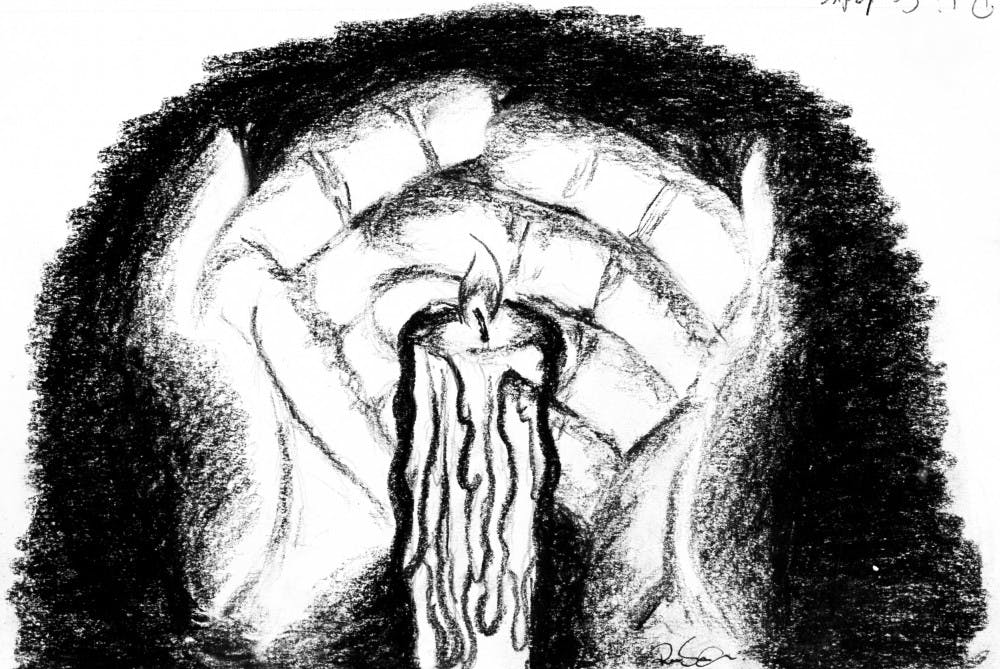Here I stand with a lit candle at this vigil along with 30 other Middlebury students, staff and faculty to remember and pray for the 132 innocent children and the eight teachers who lost their lives and 122 who received bullet injuries in a school attack by the Taliban in the city of Peshawar, Pakistan. Twelve thousand miles away, here at Middlebury College, we all come together to mourn and try to comprehend the carnage in Peshawar. We never met the dead children or their families; but we feel connected. We feel sorrow for those who lost their innocent lives, anger for the heartless savages for setting the worst example of brutality, confusion for what humanity has come to and worry for the coming generations who are witnessing the worst forms of terror in Pakistan, Afghanistan, Syria, Iraq, United States, France, Somalia and the list goes on.
The day of Dec. 16, 2014 was unlike any other normal school day for the children of the Army Public School in Peshawar, Pakistan. Dressed in their green and white uniforms, with their books and friends, these children were going about their daily routine of attending classes. But these children were unaware of their fatal fate and that this may be the last day, or the last moments that they will share with their friends, teachers and parents.
In the morning at 10 a.m., seven terrorists disguised in the Pakistani paramilitary uniform entered the school building, headed to the big auditorium where lots of children were gathered to attend a school function and opened fire at them indiscriminately. The children tried to run out of the auditorium, but there were more than enough bullets fired to kill the majority of them. As if spilling the blood of these children was not enough, the terrorists then went to classrooms, dragged scared children from under the tables and did not hesitate before putting a bullet through their tiny bodies. Most children were shot in the head. The teachers, who were trying to evacuate the children out of the classrooms, were tied to chairs and burnt alive in front of their students. How can one eulogize for these teachers and sympathize with the parents who lost the children — the noor (light) of their eyes? Thinking of words, I have none.
The death of one person can impact a whole family and their memories remain forever in the minds of those who love them. Zeest Hassan ’17 shared, “My cousin’s 18 year old son, who was the only child, was shot thrice before he died. The mother was told to look through 50 dead bodies of children lying on the floor with cloth hiding their faces. She removed the cloth one by one from 49 children’s faces and the 50th one was her son. Life is not the same for the mother anymore and receiving justice won’t bring her son back.”
The Taliban said that they want Pakistan to feel pain as they felt pain due to the Pakistan Army’s operations against the terrorists in the tribal areas of the country that killed the families and children of Taliban fighters. Yes, Pakistan did feel the pain — it is a sorrow too large to bear. But the pain made Pakistan stronger; it made humanity more united against the barbarians.
Mariam Khan ’16 whose parents are from Peshawar shared her thoughts about the event.
“My memories of Peshawar are beautiful; it is a region that is simple and seemingly from a different era. The unfortunate reality is that it is also an area that is plagued by violence and conflict because of drones, drugs and warfare.” Khan further said, “I was completely shocked and heartbroken when I heard of the events that happened on December 16th. I feel so blessed to have such an intimate perception of the events and to have the support from members of the campus community and the Scott Center for Spiritual and religious life upon my arrival to campus.”
This flickering light of this candle at this vigil is not just the remembrance of the bloodshed, but it is a symbol of unity and support that the College shares with Pakistan, with all the parents in the world who lost their children and their loved ones due to terrorism. Children are children — whether they are civilians, children of the military, or the children of Taliban fighters — they deserve love and care, not bullets and life long trauma of witnessing inhumane violence. Rahman Baba, a famous poet from Peshawar said, “We are all one body. Whoever tortures another, wounds himself.”
Artwork by RUBI SAAVEDRA
NAINA QAYYUM '15 is from Chitral, Pakistan




